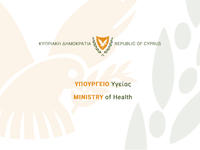Press Releases

15-12-2020 17:39
Answers to frequently asked questions about vaccines/vaccination against COVID-19 disease
1. Is vaccination against the coronavirus mandatory?
The Government’s intention is to provide full vaccination coverage of the population, since it is a serious public health issue. The vaccine will be provided free of charge to all citizens who so wish.
2. How will Cyprus obtain the vaccines against coronavirus?
The procedure for securing vaccines is carried out through a centralised procedure by the European Union and is common to all Member States. The European Commission has concluded an agreement with six pharmaceutical companies, which are now in the process of developing vaccines or are in the final stages of the authorisation and circulation of the vaccine.
3. What does the EU’s centralized process guarantee us?
Firstly, through the centralised procedure, we are able to secure the quantities we need to cover our population at the same time as all the countries of the European Union, regardless of the size of our market and to obtain vaccines at the same cost as all the other countries. As a market with little negotiating power, Cyprus is lagging behind in terms of accessibility to innovative medicines – as is the vaccine against COVID-19 – but also in terms of the time it procures these medicinal products. This joint action, therefore, ensures the timely supply of vaccines at significantly lower economic cost than if each state acted individually. It is also very important because it enables us to know what the flow of vaccines will be. Namely, when the various quantities will be received – a fact that will contribute to the planning for vaccinations.
4. How will vaccines be stored?
As mentioned above, agreements have been signed with six companies using different technologies. Each agreement specifies how vaccines are preserved and stored. The Ministry of Health has taken the necessary steps to ensure the cold chain, with the purchase of special refrigerators where necessary, transport boxes, as well as a cold chain monitoring system. Their preservation will be centralized; they will be transported to the Pharmacies of the State Health Services Organisation, where they will then be channeled to the 38 vaccination centres that exist in Cyprus, as well as to other places where vaccinations may be carried out.
5. When are the first quantities of vaccines expected in Cyprus?
It is important to reiterate that Cyprus will receive the first batch of vaccines, and then all the quantities ordered at the same time as the other EU countries.
The first batch of the Pfiser-Biontech vaccine is expected at the beginning of January, while in the 1st quarter of 2021, a second batch will be received by the same company. It is estimated that the first quantities of Moderna and AstraZeneca vaccines will also be received in the 1st quarter of 2021. The timetable in the plan that has been drawn up depends on the final dates to be announced on the basis of the evaluations of each application. We are on alert to adjust the dates so that we can respond accordingly.
6. What are the basic steps for vaccination?
Vaccination will be carried out at Vaccination Centres in Cyprus by health professionals (Visitors/Health Visitors), who have been adequately trained to administer the vaccine to citizens who want it. There is the ability to operate simultaneously up to 100 different units. The vaccination will be administered by a personal appointment, which can be programmed by the individual or their representative through the Vaccination Program Software.
The person will receive a text message on his/her phone with the details of the appointment, and there is also the possibility to send a reminder.
Vaccination will be carried out in the Vaccination Centre declared by each citizen and proof of the administration of the 1st dose will be provided either electronically or in paper form (vaccination card). At the same time as the 1st dose is administered, an appointment for the 2nd dose will be arranged.
7. Will the persons receiving the vaccine remain confined until the 2nd dose is administered?
No, a citizen who receives the 1st dose of the vaccine does not need to remain confined until the 2nd dose. The standard practice as with any other vaccine will be followed.
8. Will vaccination be repeated at regular intervals or will it be administered only once?
At this stage, we are not in a position to know. The first volunteers were vaccinated in early summer, so it will be something we will know after a year has passed since the vaccine was administered to the volunteers. What we know at the moment is that vaccines protect against a serious disease, so we aim to reduce hospitalisations and deaths.
9. Which population groups can receive the vaccine?
Each vaccine will have its own characteristics. Some are tested on specific population groups, based on age or other characteristics. Some may be recommended for a certain category of the population and some may not be recommended. The vaccines approved, are approved on the same basis of efficiency and safety criteria.
10. Has there been a hierarchy of population groups that will have priority in vaccination?
In cooperation with the Scientific Advisory Committee on coronavirus, as well as on the basis of the clinical studies carried out by each company, a list has been prepared concerning priority groups of the population that will be invited to receive the vaccine.
The hierarchy prepared is as follows:
1. Residents and staff of senior people’s homes and institutions for chronic adult illnesses and
Health professionals: Workers in hospitals with COVID-19 patients, and in all ICU, Accident and Emergency Departments, Ambulance Departments (regardless of COVID hospitalisation).
2. People > 80 years old (priority in vulnerable groups).
3. People > 75 years old (priority in vulnerable groups).
4. Individuals >= 16 years of high risk for severe disease.
5. People working in Primary Health Care Centres, followed by other health professionals/personnel, and residents in other closed structures, such as prisons and hosting centres for refugees and migrants.
6. The rest of the population according to age.
11. According to the plan drawn up, when are the above groups of the population expected to be vaccinated?
Subject to the completion of procedures for the approval of applications for authorisation and circulation of vaccines by the European Medicines Agency and their distribution to the Member States and without changing the quantities committed to each batch, vaccinations should be carried out as follows:
|
Category of citizens |
Total number of citizens |
Vaccination period |
|
Senior People’s Homes/Institutions for Chronic adult illnesses |
2,294 staff |
January 2021 |
|
3,882 residents |
||
|
Health Professionals(ICU, Accident and Emergency Departments, Ambulance Departments, Hospital Departments with Covid-19 chambers) |
1,000 |
January 2021 |
|
Persons > 80 years old |
33,530 |
Vaccination will begin in January 2021 and completed the 1st quarter of 2021 |
|
Persons >75 years old |
27,667 |
1st quarter of 2021 |
|
Persons >= 16 years of high risk for severe disease |
|
1st and 2nd quarter of 2021 |
The main goal, provided that deadlines are kept, is within the first half of 2021 to have completed the vaccination coverage of more than 40% of the Cyprus citizens, which includes the elderly and people working in closed structures, as well as healthcare professionals and people at high risk for serious illness. In this way, the protection of these people from possible infection with the virus will be achieved, while hospitals will be discharged of hospitalizations and deaths of COVID-19 patients and consequently the Health System will be protected.
(MPO/EK)
Relevant Press Releases







